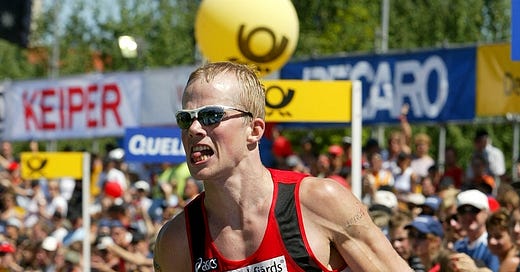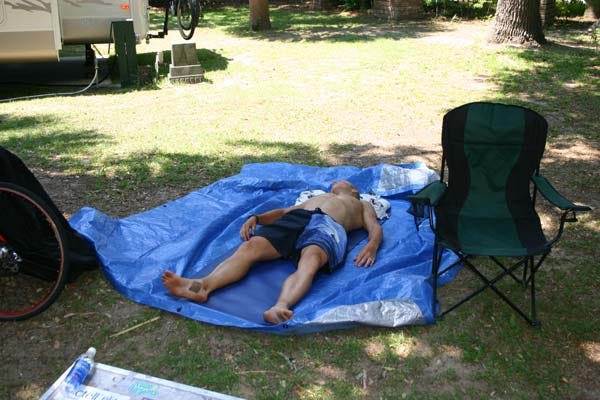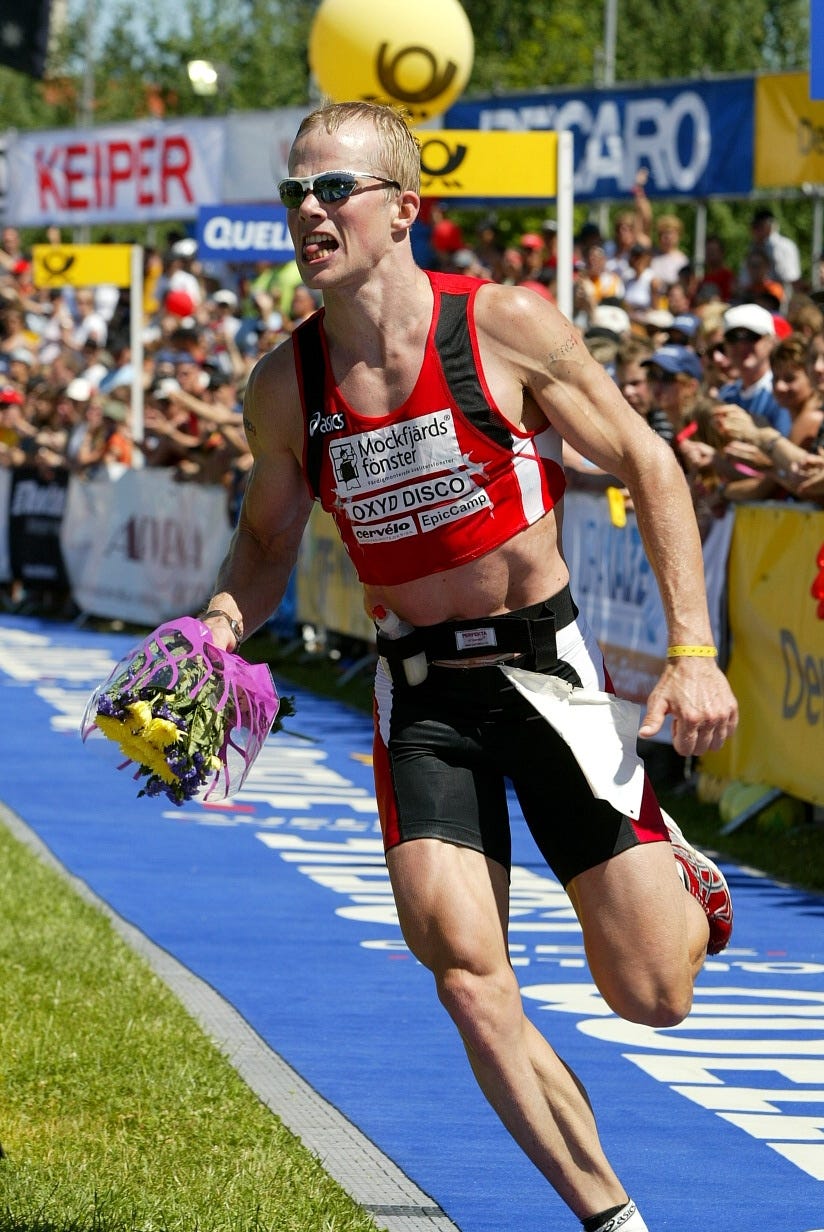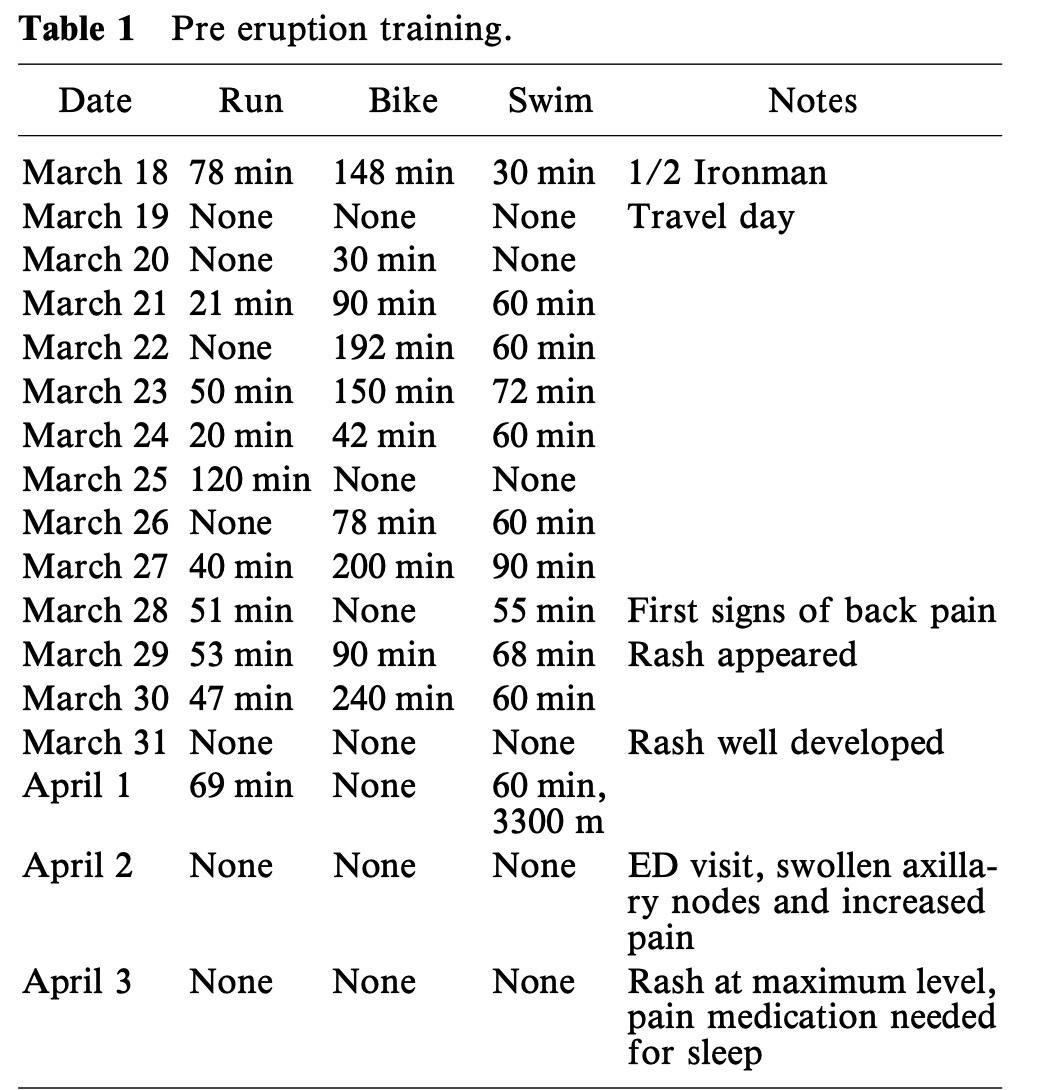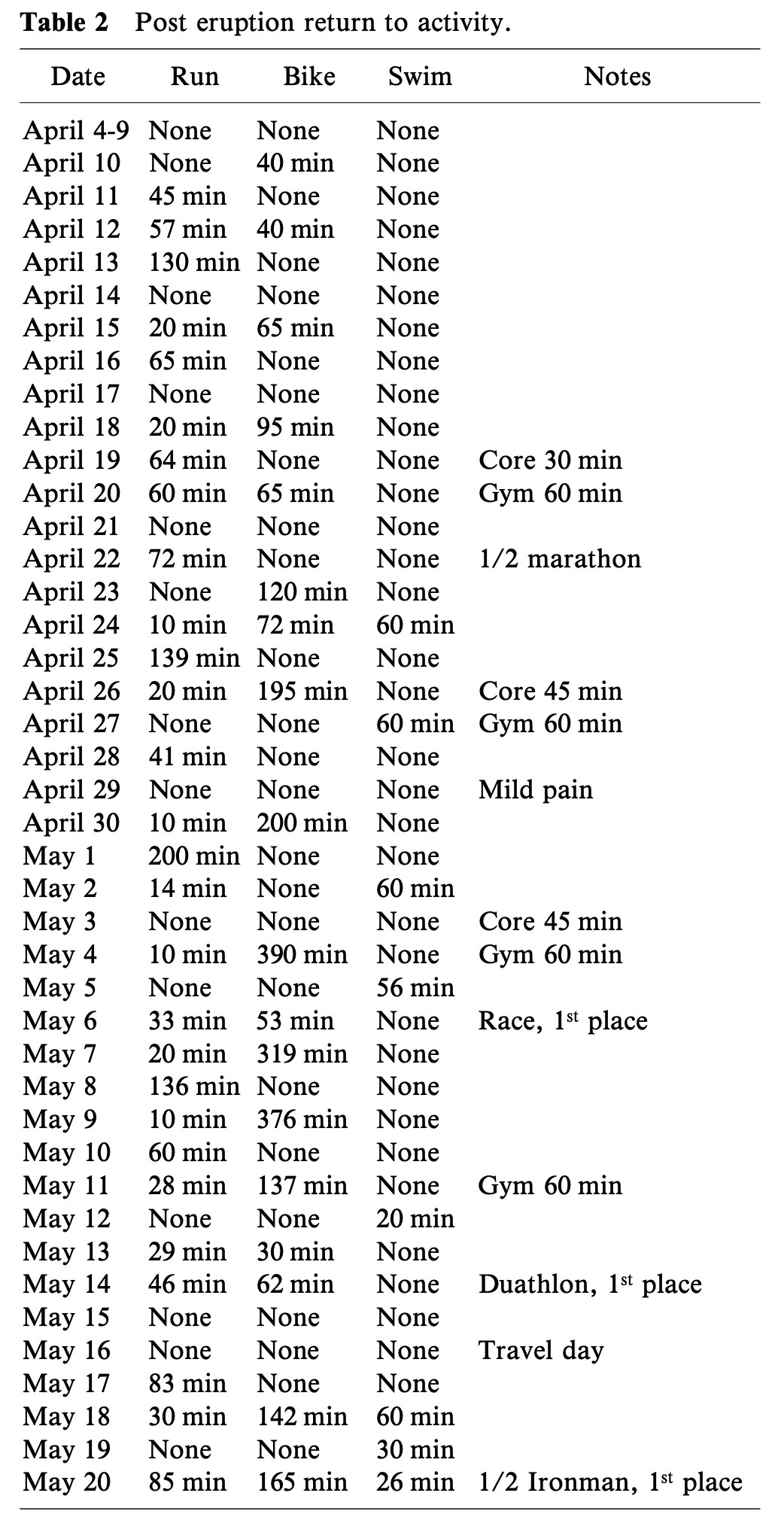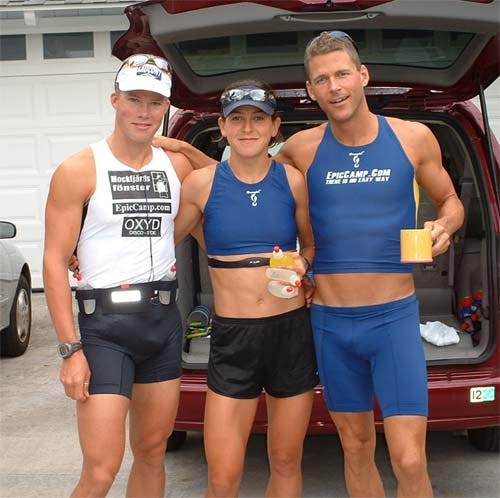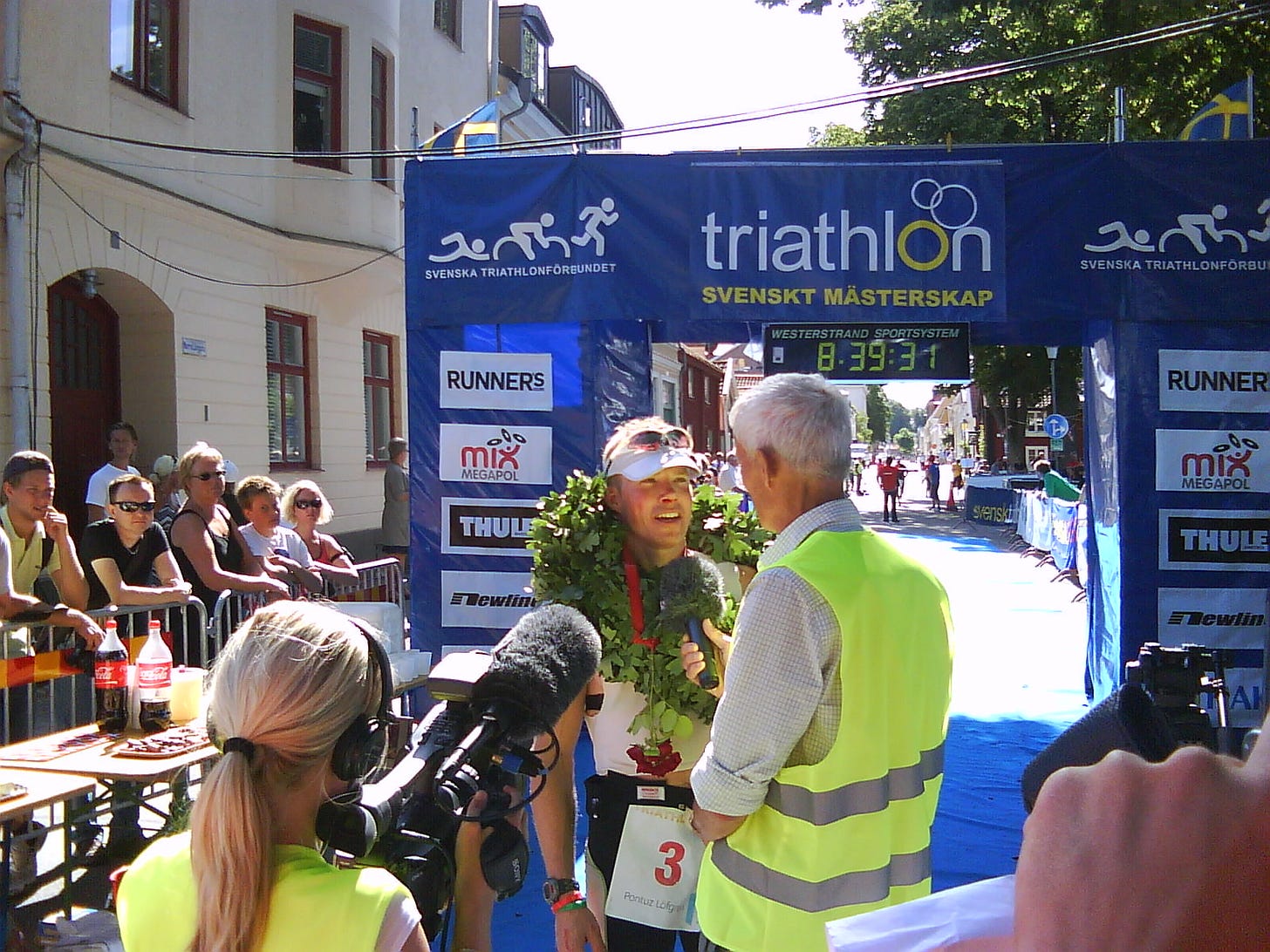In Part One we covered the conditions required for overtraining syndrome. We also laid out the signs of maladaptive stress, which is far more common.
Part Two explained that the conditions, in themselves, are not enough to make us sick.
To spiral down to illness we need to interrupt the body’s capacity to recover.
I laid out my experience with stimulants and depressants.
We closed with a warning to back off once sleep is erratic.
As you can see in the picture above, sleep wasn’t a problem for Clas. As well as being a world-class athlete, he was a world-class sleeper.
We trained hard, we slept great, we recovered and we performed.
In 2005, my non training life changed with:
My marriage to Monica
An business start up in Europe
A relocation of my consulting business from New Zealand to Bermuda
I ended up overreached twice but avoided full-blown overtraining. My fitness was deep enough to race well, even when tired.1
Clas had similar experiences. A 2005 highlight was taking the Swedish Ironman Record at Roth (from Colting).
I’m going to walk you through a six year period in Clas’ life:
The Year Before Burnout (2006)
Rock Bottom (2007)
Return To Health (2008)
Return To Competition (2009)
Cured (2011)
The Year Before Burnout
In 2006, after recovering from shingles, he improved his Swedish Record at Roth.
2006 is when a downward spiral took hold.
He had shingles2 in the spring
Made a full recovery over five weeks
After his tests came back in normal ranges, he returned to training
He continued to perform at a world-class level.
In July, he lowered his Swedish Ironman Record
In September, he finished 2nd at Ironman UK
From the Case Report and Evaluation:
The patient recovered completely with no scarring or residual symptoms including post-herpetic neuralgia. He returned to his initial training regimen over the next five weeks (Table 2) and began competing successfully in international events. However, three months later, he subsequently developed profound fatigue, overtraining syndrome (Fry et al., 1991, Kuipers and Keizer, 1988), and an immuno- compromised state. At the time of writing, 18 months later, the patient has not returned to competitive sports.
Do you notice anything about his post eruption return to activity?
He isn’t swimming much.
Swimming is fatiguing for Clas. He’s muscular with low body fat, what we call “a sinker.”
Avoiding swimming was a “tell” for Clas.3 Given that his medical team could find nothing wrong… he pushed on.
You are going to have sessions, sports and conditions that you avoid when you’re run down.
Learn your fatigue patterns.
Pay attention to your sleep quality.
Rock Bottom
The winter of 2006 / 2007 is when Clas found himself beyond fatigue.
After months of sleeping less, and training hard, he crashed.
For 90 days, the smallest decision would trigger a panic attack.
He found his mind overreacting to everything.
His description:
When we have a physical injury, we can sit on the couch and rest. With adrenal burnout, it is different.
Our mind is constantly overstimulating our body. I could have healed faster if I could relax my mind but it wasn’t possible. I was always overstimulated.
It was like having a war zone in my head. My mental system was in chaos.
His medical team could not find nothing wrong with him.4
Blood Markers
Brain X-ray
Heart Scan
All testing came back normal. Adrenal burnout was literally in his head.
Slowly, his mind settled and the panic attacks reduced in frequency.
Those nine months were the worst. I couldn’t even read.
Recovery
With the help of his mental skills coach he developed a plan.
Find peace in the mind
End the urgency with returning to training
Pause all competitive plans
Do not plan the comeback
In the Summer of 2007, 10 months after the break:
Clas put on a favorite bike jersey
Rode TEN MINUTES around the neighborhood
Spent the rest of the day in bed
Took the next day off
It went on for months.
Short Workout
Day Off
Short Workout
Day Off
10 minutes, 15 minutes, 20 minutes, 30 minutes… gradually building the session duration.
When you’re healthy you don’t think too much about a down day.
When you’re coming back from Burnout, you’re always second guessing and overthinking.
Worried that you blew it and will slide backwards.
You need a support system for the setbacks. They are a normal part of the recovery.
This went on for 18 months. A period which included the tragic death of his long term girlfriend, Kristy Gough, in a cycling accident.
Return To Competition
By the Spring of 2009, body and mind were healthy.
It had been a long journey, 3 years since he had Shingles.
In May 2009, he decided to race Ironman Kalmar.
The idea was to train, and race, for fun.
To come back and get one done.
Focusing on the fun worked.
He was relaxed
His recovery was good
He was enjoying the process
Vitality had returned.
I noticed that I was able to come back to physical stress more quickly than mental stress.
When I announced my intention to race Kalmar, I found the attention I received stressful.
I told myself, “You have to accept who you are, Swedish Ironman Record Holder.”
We need to let other people think their thoughts.
This race was going to be for myself.
My only goal was to finish.
The race went well. I’ll let Clas describe the marathon for you.
In Clas’ voice:
After a bike split of 4.34 it was finally time to get into my running shoes. I was now in 5th place, just a few minutes up to 2nd but 14.5 minutes up to 1st place. The run course was a 7 K out and back loop that we ran 3 times.
I fell into a comfortable pace and put the Ks behind me. After 10 K I ran myself into 2nd place and I just felt better and better.
After 2 of the 3 loops I was 7 minutes behind the race leader, and I felt my 2nd place was safe. I decided to give it a go and try to catch Ted in the lead. I knew I had to close most of the gap going out to the last turnaround. I put the hammer down and ran hard out to the turnaround with 7 K to the finish. I was now only 1.38 minutes back, and he kind of panicked and sped up as much as he could. I managed to catch him with 3 K to go. When I caught him he tried a last surge, but by now my adrenaline was pumping so I had no problems to follow. After 300 to 400 m I was able to get a small gap, and when this happened I just kept running as hard as I could. The gap grew quickly but I was in some kind of out of body experience and just kept running hard.
It’s funny how it works. When you run along with a medium pace you feel every pain in your body, but when you come in a situation like I was in now you don’t feel anything. You are so focused on pushing yourself that nothing can disturb your focus.
I don’t remember much from those last Ks running, I kind of woke up when I had crossed the finish line and I was so happy. It’s still hard for me to put my feelings in words (and it’s not because English is my 2nd language).
It has been 3 long years of suffering from overtraining, adrenal burnout, my long-time girlfriend Kristy Gough death…. It felt like it would never end. Even if a victory like this doesn’t change some things, it does feel like it’s a little revenge for the things that I have gone through over the last years. Kristy will always have a special place in my heart.
It also shows that if you believe in what you are doing and want something badly you can achieve it.
Of course I was very happy to win the race, get the Gold medal in the Swedish Championship and set a new course record. The biggest victory was the fact that I have my health back and was able to finish an Ironman again. If I can keep training and racing with my heart instead of my ego the results will come too!
The Cure
But he wasn’t completely healthy, not yet.
It was time for the final part of the recovery.
For the two weeks after the race, Clas was on a high.
But, after a month, he could feel the downward spiral start again.
In his mind, he knew it was time to stop racing professionally.
It wasn’t until two years later, when he went public with his decision, that the final recovery began.
Six months after his “retirement,” his mind was clear and he found peace again.
Clas continues to train, race and enjoy athletic successes.
Back To Table of Contents
My story was maladaptation from excessive stress.
You can read a medical report on his experience here.
Swimming is a “tell” for me, too. When I’m rundown, I have an aversion to getting wet.
Clas recommends that you make sure to rule out physical issues with your medical team. He’s glad he went through his tests.

